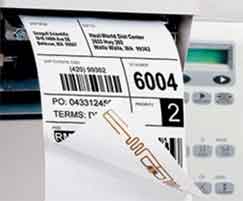Below are three of the top stories in automated data collection, RFID and the Internet of Things in recent weeks.
Falling IoT Sensor Prices could Spur Supply Chain Adoption
Microsoft's recently released its 2019 Manufacturing Trends report, which says that the average price of an Internet of Things (IoT) sensor has declined from $1.30 in 2004 to $0.44 in 2018, headed to 38 cents in 2020.
Supply Chain Digest Says... |
 |
| Imping has bounced back from a challenging 2018 that saw declining revenue and an audit investigation. |
 |
What do you say? |
| Click here to send us your comments |
 |
| Click here to see reader feedback |
|
|
Those falling prices will be part of the reason there will be 36.13 billion connected IoT devices by 2021, Microsoft predicts.
The sensors will enable applications like predictive maintenance and the ability to "intelligently route orders and automate work streams," Microsoft says.
"Today, data-optimized smart machines can receive input from a wide range of sources - from customer order data to production data - to enable more agile manufacturing, improve production efficiency, and provide greater visibility into operational performance," Microsoft added in the report.
SCDigest notes progress in IoT in supply chain remains by our view very slow.
Small T-Shirt Company Benefits from RFID Item-Level Tagging
One of the long-time questions with RFID is whether suppliers can benefit from customers mandating RFID tagging, especially in the apparel sector.
South Carolina T-shirt manufacturer Southern Fried Cotton (SFC) has found the answer to that question is Yes, according to a report in Apparel magazine.
Despite rapid growth since it was founded in 2012, Southern Fried Cotton was still using manual, paper-based approaches to its distribution processes. But after being required to put RFID tags on it products for one retail customer, the company decided to see if it benefit from using the tags itself.
SFC creates and produces labels with embedded RFID on-demand. They pick shirts labeled with RFID tags, after which they are scanned by readers, identifying precisely what shirts have been picked and how many are in a stack.
(See More Below)
|
CATEGORY SPONSOR: SOFTEON |
|
|
| |
|
|
 SFC later added a carton audit solution, which allows it to pack and verify carton-pack accuracy by quickly reading the identification of all shirts inside the box, data which also then drives each carton's Advance Ship Notice (ASN) creation. SFC later added a carton audit solution, which allows it to pack and verify carton-pack accuracy by quickly reading the identification of all shirts inside the box, data which also then drives each carton's Advance Ship Notice (ASN) creation.
SFC says as a result ir now has much better inventory accuracy, while its order accuracy, once a significant and costly problem, now tops 99.54%. As a result, its chargebacks from retailers were reduced by 98.8%.
SCDigest will just note that since SFC was not using bar code scanning before RFID, it is impossible to quantify how much additional benefit RFID would have brought versus bar coding.
RFID Company Impinj has Strong Q3 Results
We keep track pretty regularly of the fortunes of Impinj, the Seattle-based leading provider of RFID inlays and readers.
 To say its financials and stock price have been up and down is putting it mildly. To say its financials and stock price have been up and down is putting it mildly.
Its just released Q3 earnings report was mostly good news, with revenue up 19% versus 2018, taking sales to a record $40.8 million.
Impinj also achieved a small profit of nine cents per share in the quarter, albeit on a non-GAAP basis. It lost five cents per share in Q3 2018
Shares went up slightly in after-hours trading but dropped back down. Impinj stock, however, has more than doubled this year.
Imping has bounced back from a challenging 2018 that saw declining revenue and an audit investigation.
Impinj CEO Chris Diorio cited the jump in revenue to success in the apparel and footwear segment, "with retailers and brands publicly citing the benefits of RAIN tagging including inventory optimization, improved labor productivity and sales uplift."
In Q2, Impinj filed a patent infringement suited again the much larger,Dutch semi-conductor company NXP, alleging NXP copied its chip designs.
NXP, in turn, filed its own patent-infringement lawsuit against Impinj in October.
Any reaction to the stories in this week's roundup? Let us know your thoughts at the Feedback section below.
Your Comments/Feedback
|